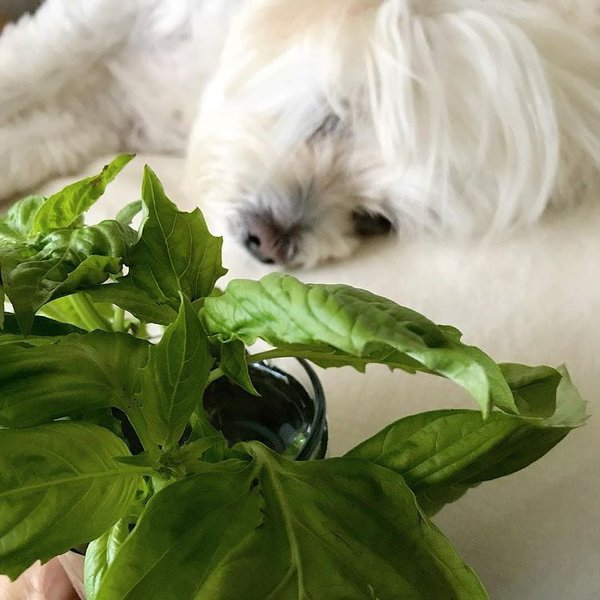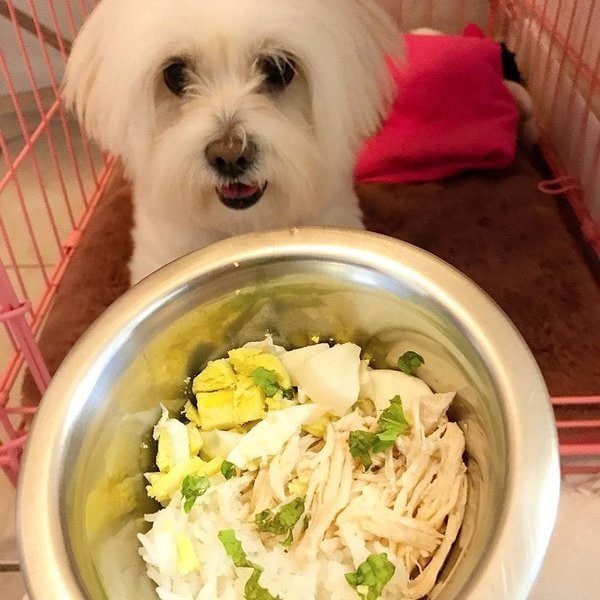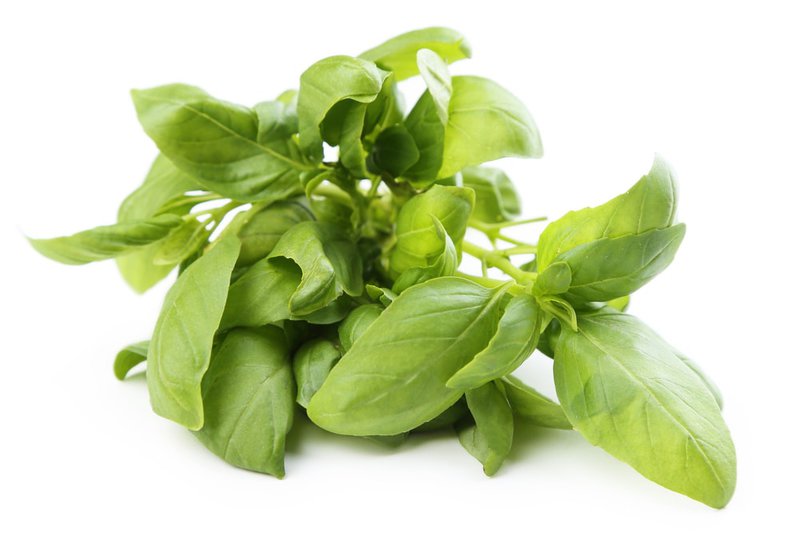Basil is a popular herb many dog owners give to their pooches. Yet, the safety of this plant is a controversial topic. It is likely that you are here because you are also seeking an answer to this question. If that is the case, you are not alone.
Yes, dogs can eat basil, but it should not be excessive. As long as you feed your dog this herb only in moderation, there wouldn’t be an issue, like stomach upset. Basil also contains antioxidants to fight off inflammation, thereby improving the overall dog health.
It is commendable that you have decided to invest your time to find out about the safety of basil for your canine. You have made the right choice by clicking on this article. You will find valuable information that will help you answer the question and related inquiries about dogs and basil.
How Much Basil Can I Give My Dog?

This is a tricky question because it depends on the health status of your pooch. Basil is primarily human food. Therefore, your canine does not have the digestive capability to process it like a human being. This should serve as ample warning before you consider giving basil or food seasoned with this herb to your beloved pooch.
Dogs And Their Love For Basil
Many dogs enjoy eating basil. Therefore, it is easy for you to assume that the herb is beneficial to your pooch. However, you have to understand that dogs are like kids – they don’t know what is safe for them! They would eat anything as long as it is tasty, even when it can damage their health in the short or long run.
You must never lose sight of this fact when considering the safety of basil for your dog. You will be making a huge mistake if you assume that the fact that your pooch loves eating basil makes it safe. Canines do not know the food that should be added or left out of their diet. As long as the food is tasty, they will munch it and enjoy it thoroughly.
Even if it is a poison that is tasty, your pooch can consume it at first before suffering the repercussions later. Am I trying to say that basil is poisonous? Far from it. I am simply trying to help you understand that the fact that your canine loves to eat any food does not mean that it is safe. It is your responsibility to seek professional guidance to protect your pooch.
Basil As A Food For Dogs
In human food, basil serves as a spice in cooking or as an herb. In the US, people consume stems and leaves. It has a strong, earthy, and sweet taste. Therefore, it is not surprising that dogs love to eat it. Still, it is vital that you double-check the health implication of any food before you offer it to your four-legged furry friend.
Types Of Basil For Dogs
There are various types of basil that dogs eat. Nonetheless, the most common types are lemon basil, sweet basil, and Thai basil.
Each of these types of basil has its peculiarities that make people and canines have their preferences. Still, they have almost the same nutritional value. Therefore, you should be more concerned about the quantity of basil that is safe for your pooch.
For example, if lemon basil is not safe for your pooch because of the health implications of taking it, you can be certain that the story will be the same for sweet basil. Your canine might prefer sweet basil to Thai basil. What matters is that the health of your canine is intact regardless of the preference.
Is Basil Beneficial To Dogs?

There are several ways basil is beneficial to dogs. Many canines love to eat this herb because of its taste. However, beyond the taste, basil also has several health benefits that your pooch can enjoy.
Health Benefits Of Basil To Dogs
Basil has several health benefits that your pooch can enjoy because of the nutrients it contains. It contains essential nutrients including:
- Antioxidants
- Vitamin K
- Vitamin A
- Calcium
The antioxidants in basil make it a fantastic anti-inflammatory herb. These antioxidants bind to free radicals in the body of dogs that promote the suppression of inflammation. Many studies have confirmed this, but more research is needed in this regard. Also, its vitamins K and A are essential to keep your pooch healthy.
Vitamin K is important in blood clotting, while vitamin A gives your better canine eyesight and improves the health of the body systems. Basil can also help in the reduction of blood sugar, which prevents diabetes, especially type 2 diabetes.
Basil also has the ability to help in the detoxification of the body of your pooch to eliminate harmful toxins. Therefore, it is obvious that this herb has numerous health benefits that your canine can enjoy. On this basis, you should not have any issue with letting your four-legged furry eat this herb.
Nutritional Value Of Basil For Dogs
As earlier mentioned, every form of basil contains almost the same nutrient. The herb contains essential nutrients such as vitamins A and K, antioxidants, calcium, and more.
So, it is obvious that basil has nutritional value to your pooch. Studies have shown that this herb contains compounds that can lower blood sugar and fight against bacterial infections.
Some studies have also shown that the oil found in sweet basil is effective in treating skin infections in dogs because they are active against bacteria. Therefore, it makes sense to allow your pooch to eat this herb due to its health benefits. However, dog experts argue that you don’t need to give basil to your dog.
The reason for this claim is that most of the nutrients in the herb are present in the regular diet of your pooch. Therefore, if you ensure that your four-legged furry friend has a balanced diet daily, basil becomes a luxury rather than a necessity. The danger of letting your dog consume a large number of such foods is that it can become excessive, hurting your canine.
Is Basil Harmful To Dogs?
Generally, basil is safe for pooches. We have established the fact that it has nutritional value and health benefits. Yet, you have to consider some factors to ensure that your canine does not get hurt by consuming this herb.
How Much Basil Is Safe For Dogs?
It is weird that many dogs love to eat basil despite the fact that they are natural carnivores. Still, there are certain risks involved, especially when they eat it in excess. Some canines are sensitive to extra fiber, which leads to increased movement in their digestive tract. This is one of the reasons some dogs have loose stool after eating basil.
What Happens If A Dog Eats Basil?
As stated earlier, basil is generally safe for dogs. So, a small quantity of it should not hurt your canine. However, if your pooch has a sensitive stomach to excess fiber, it might lead to trouble. So, normally, there is no cause for alarm if your dog consumes this herb. Yet, watch out for any strange behavior.
If you notice that your canine is displaying signs of sickness or uneasiness after eating basil, contact your vet immediately. Delay can lead to more terrible health consequences. Therefore, you should act quickly.

Health Hazards Of Basil For Dogs
Even if you are not sure whether or not basil is safe for your dog, you have to be observant. Observation is a quality every pooch owner must possess. You have to be watchful because there are health hazards that your canine might suffer in some cases after eating basil. Diarrhea and allergic reactions are the most common.
Diarrhea
If a dog that has a sensitive stomach to additional fiber eats basil, it can lead to loose stool. In some cases, it is worse. It leads to full-blown diarrhea when some pooches eat this herb. If your canine is in this category, basil should be avoided at all costs.
Even if your pooch does not have a sensitive stomach to extra fiber or is allergic to basil, moderation should always be your watchword. A pooch that is not allergic to this herb can still encounter some problems such as stomach upset. If you are not sure about how much basil you should give your dog, contact your vet for professional guidance.
Allergic Reactions
It is possible that your canine is allergic to basil. As a dog owner, you have to be aware of the allergies of your four-legged furry. This will enable you to protect your pooch when necessary. Dogs that have basil as one of their allergies should never be allowed to eat this herb because it will have a negative impact on them.
If your pooch is allergic to basil, you will notice some of these symptoms:
- Fatigue
- Fever
- Nausea
- Itching
- Diarrhea
Once you notice these signs after your canine ate basil, you need to contact your vet as soon as possible. In some serious cases, your vet might have to watch your pooch for more than a day to know the right step to solve the problem.
Prevention is better than cure. Therefore, it is vital that you don’t allow your pooch to consume this herb when you notice these symptoms once again.





